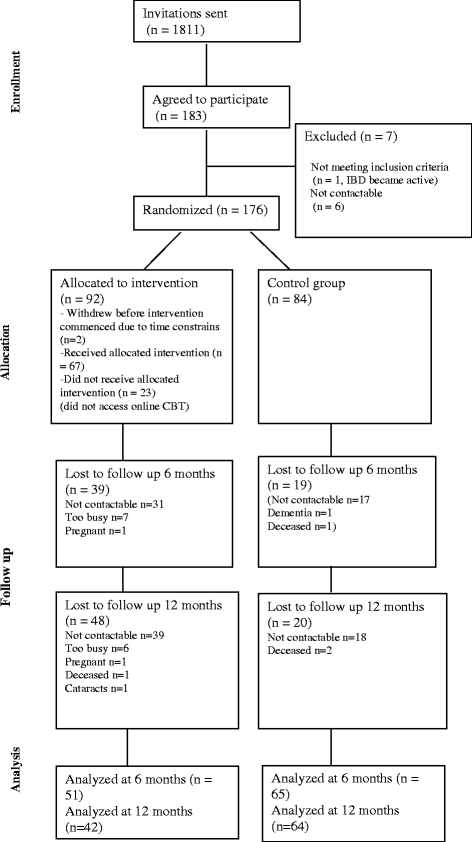Cognitive-behavioural therapy has no effect on disease activity but improves quality of life in subgroups of patients with inflammatory bowel disease: a pilot randomised controlled trial
- PMID: 25934170
- PMCID: PMC4427935
- DOI: 10.1186/s12876-015-0278-2
Cognitive-behavioural therapy has no effect on disease activity but improves quality of life in subgroups of patients with inflammatory bowel disease: a pilot randomised controlled trial
Abstract
Background: Studies have demonstrated usefulness of cognitive-behavioural therapy (CBT) in managing distress in inflammatory bowel disease (IBD); however, few have focused on IBD course. The present trial aimed to investigate whether adding CBT to standard treatment prolongs remission in IBD in comparison to standard therapy alone.
Methods: A 2-arm parallel pragmatic randomised controlled trial (+CBT - standard care plus either face-to-face (F2F) or online CBT over 10 weeks versus standard care alone (SC)) was conducted with adult patients in remission. IBD remission at 12 months since baseline was the primary outcome measure while the secondary outcome measures were mental health status and quality of life (QoL). Linear mixed-effect models were used to compare groups on outcome variables while controlling for baseline.
Results: Participants were 174 patients with IBD (90 +CBT, 84 SC). There was no difference in remission rates between groups, with similar numbers flaring at 12 months. Groups did not differ in anxiety, depression or coping at 6 or 12 months (p >0.05). When only participants classified as 'in need' (young, high baseline IBD activity, recently diagnosed; poor mental health) were examined in the post-hoc analysis (n = 74, 34 CBT and 40 controls), CBT significantly improved mental QoL (p = .034, d = .56) at 6 months. Online CBT group had a higher score on Precontemplation than the F2F group, which is consistent with less developed coping with IBD in the cCBT group (p = .045).
Conclusions: Future studies should direct psychological interventions to patients 'in need' and attempt to recruit larger samples to compensate for significant attrition when using online CBT.
Trial registration: The protocol was registered on 21/10/2009 with the Australian New Zealand Clinical Trials Registry (ID: ACTRN12609000913279).
Figures
Similar articles
-
Cognitive-Behavioural Therapy for Inflammatory Bowel Disease: 24-Month Data from a Randomised Controlled Trial.Int J Behav Med. 2017 Feb;24(1):127-135. doi: 10.1007/s12529-016-9580-9. Int J Behav Med. 2017. PMID: 27432441 Free PMC article. Clinical Trial.
-
Effectiveness of cognitive-behavioral therapy on quality of life, anxiety, and depressive symptoms among patients with inflammatory bowel disease: A multicenter randomized controlled trial.J Consult Clin Psychol. 2017 Sep;85(9):918-925. doi: 10.1037/ccp0000227. J Consult Clin Psychol. 2017. PMID: 28857595 Clinical Trial.
-
The effectiveness of cognitive behavioral therapy on the quality of life of patients with inflammatory bowel disease: multi-center design and study protocol (KL!C- study).BMC Psychiatry. 2012 Dec 14;12:227. doi: 10.1186/1471-244X-12-227. BMC Psychiatry. 2012. PMID: 23237076 Free PMC article. Clinical Trial.
-
Psychotherapy for inflammatory bowel disease: a review and update.J Crohns Colitis. 2013 Dec;7(12):935-49. doi: 10.1016/j.crohns.2013.02.004. Epub 2013 Mar 5. J Crohns Colitis. 2013. PMID: 23466412 Review.
-
Systematic review with meta-analysis: online psychological interventions for mental and physical health outcomes in gastrointestinal disorders including irritable bowel syndrome and inflammatory bowel disease.Aliment Pharmacol Ther. 2018 Aug;48(3):244-259. doi: 10.1111/apt.14840. Epub 2018 Jun 14. Aliment Pharmacol Ther. 2018. PMID: 29901820
Cited by
-
People with Inflammatory Bowel Disease Prefer Cognitive Behavioral Therapy for Fatigue Management: A Conjoint Analysis.Dig Dis Sci. 2024 Jul;69(7):2345-2353. doi: 10.1007/s10620-024-08468-9. Epub 2024 May 11. Dig Dis Sci. 2024. PMID: 38733451 Free PMC article.
-
Psychosocial interventions for adults with newly diagnosed chronic disease: A systematic review.J Health Psychol. 2022 Jun;27(7):1753-1782. doi: 10.1177/1359105321995916. Epub 2021 Feb 14. J Health Psychol. 2022. PMID: 33586486 Free PMC article.
-
Psychological interventions for treatment of inflammatory bowel disease.Cochrane Database Syst Rev. 2025 Apr 17;4(4):CD006913. doi: 10.1002/14651858.CD006913.pub3. Cochrane Database Syst Rev. 2025. PMID: 40243391
-
Illness perceptions and stress: mediators between disease severity and psychological well-being and quality of life among patients with Crohn's disease.Patient Prefer Adherence. 2016 Nov 23;10:2387-2396. doi: 10.2147/PPA.S118413. eCollection 2016. Patient Prefer Adherence. 2016. PMID: 27920505 Free PMC article.
-
Non-pharmacological Interventions for Anxiety and Depression in Adults With Inflammatory Bowel Disease: A Systematic Review and Meta-Analysis.Front Psychol. 2020 Nov 5;11:538741. doi: 10.3389/fpsyg.2020.538741. eCollection 2020. Front Psychol. 2020. PMID: 33250803 Free PMC article.
References
-
- Camara RJ, Ziegler R, Begre S, Schoepfer AM, von Kanel R, Swiss Inflammatory Bowel Disease Cohort Study group The role of psychological stress in inflammatory bowel disease: quality assessment of methods of 18 prospective studies and suggestions for future research. Digestion. 2009;80(2):129–39. doi: 10.1159/000226087. - DOI - PubMed
Publication types
MeSH terms
Associated data
LinkOut - more resources
Full Text Sources
Other Literature Sources
Medical


